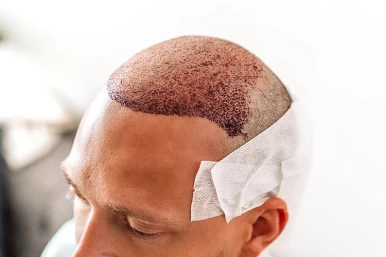
Introduction
Hair transplants are a great way to restore hair, but the process doesn’t stop after the surgery. Proper care and lifestyle changes are important for ensuring healthy hair growth. Many people wonder, “How to improve hair growth after a hair transplant?” This article will guide you through the best tips and practices for faster and better results.
Understanding Hair Growth After a Hair Transplant
Understanding hair growth after a hair transplant is essential for managing expectations and ensuring proper care. In the first few weeks, the transplanted hair may shed, which is a normal part of the healing process as follicles enter a resting phase. Around 3 to 4 months, new hair starts growing, initially appearing thin and fine. By 6 to 9 months, the hair thickens, and noticeable improvements can be seen. Full results typically take 12 to 18 months, as the hair reaches its natural density and texture. Proper aftercare, including a nutrient-rich diet, scalp hygiene, and avoiding stress, plays a crucial role in healthy regrowth. Patience is key, as hair growth is a gradual process, but with time and care, the results become natural and long-lasting.
Hair transplant surgery moves healthy hair follicles to areas with hair loss. The new hair needs time to grow and become thick. Usually, hair growth follows a set pattern:
Weeks 1-2: Healing stage; redness and scabs appear on the scalp.
Weeks 2-4: “Shock loss” occurs, where transplanted hairs fall out.
Months 1-3: Hair follicles enter a resting phase.
Months 4-6: New hair starts growing, though thin and uneven.
Months 7-12: Hair thickens and becomes more natural-looking.
Months 12-18: Final results are visible, with full hair growth achieved.
Following the right steps can improve the speed and quality of hair growth after a transplant.
To improve hair growth, especially after a hair transplant, it’s essential to follow a healthy routine that supports scalp and follicle health. Eat a nutrient-rich diet high in protein, vitamins (A, C, D, E), iron, zinc, and biotin to strengthen hair follicles. Stay hydrated to promote blood circulation and keep the scalp nourished. Use mild, sulfate-free shampoos and follow proper scalp hygiene to prevent infections. Avoid excessive heat styling, harsh chemicals, and tight hairstyles, as they can weaken hair and cause breakage. Regular scalp massages with natural oils like coconut or castor oil can improve circulation and stimulate growth. Reduce stress through relaxation techniques, as high stress levels can trigger hair shedding. Lastly, follow your surgeon’s post-transplant care guidelines and be patient, as consistent care will lead to stronger, healthier hair over time.
1. Follow Post-Surgery Care Instructions
Your doctor will give you detailed instructions on how to take care of your scalp. Follow them carefully to avoid infection and ensure faster healing.
Avoid touching or scratching your scalp.
Sleep with your head elevated for the first few nights.
Wash your hair gently as per your doctor’s advice.
2. Eat a Healthy Diet
Good nutrition plays a key role in hair growth. Include the following foods in your diet:
Protein-rich foods like eggs, chicken, and fish help strengthen hair.
Iron-rich foods such as spinach and lentils improve blood circulation to the scalp.
Vitamins A, C, D, and E support healthy hair growth.
Biotin and Zinc boost hair follicle strength.
3. Stay Hydrated
Drinking enough water keeps your scalp hydrated and promotes hair growth. Aim to drink at least 8-10 glasses of water every day.
4. Avoid Smoking and Alcohol
Smoking and alcohol slow down the healing process and can negatively impact hair growth. Avoid them for at least a few months after the transplant.
5. Use Mild Shampoos and Conditioners
Harsh shampoos can irritate the scalp and damage new hair. Use a mild, sulfate-free shampoo to keep your scalp clean and healthy.
6. Massage Your Scalp Gently
Scalp massages improve blood circulation, which helps nourish the hair follicles. Use your fingertips to massage your scalp gently for a few minutes daily.
7. Avoid Direct Sun Exposure
The scalp is sensitive after a hair transplant. Avoid direct sunlight for the first few months. If you need to go outside, wear a hat or use sunscreen on your scalp.
8. Reduce Stress
Stress can lead to hair loss and slow down recovery. Practice relaxation techniques such as meditation, yoga, or deep breathing to reduce stress.
9. Avoid Strenuous Exercise
Intense physical activity can increase sweating and affect healing. Avoid heavy workouts for at least 2-4 weeks after surgery.
10. Take Prescribed Medications
Your doctor may prescribe medications to prevent infections and support hair growth. Take them as directed for the best results.
Long-Term Hair Care Tips
Maintaining healthy hair in the long run requires a consistent hair care routine that nourishes and protects your scalp and follicles. Use a gentle, sulfate-free shampoo to cleanse the scalp without stripping natural oils, and follow up with a moisturizing conditioner to keep hair hydrated. Eat a balanced diet rich in proteins, vitamins, and minerals like biotin, zinc, and iron to support strong, healthy growth. Avoid excessive heat styling, harsh chemicals, and tight hairstyles, as they can weaken hair and lead to breakage.
- Be Patient
- Hair growth takes time, and full results can take up to a year. Be patient and trust the process.
- Regular Hair Trims
- Trimming your hair every few months keeps it looking neat and healthy. Avoid cutting too short near the transplanted areas.
- Use Hair Growth Supplements
- Supplements like biotin, collagen, and fish oil can help improve hair health and growth. Consult your doctor before taking any supplements.
- Stay Consistent with Hair Care Routine
- A consistent hair care routine helps maintain healthy hair. Use gentle products, avoid excessive heat styling, and keep your scalp clean.
Conclusion
A successful hair transplant depends on proper care and patience. By following these tips, you can improve hair growth and enjoy thick, healthy hair. Always follow your doctor’s advice and maintain a healthy lifestyle to achieve the best results.
